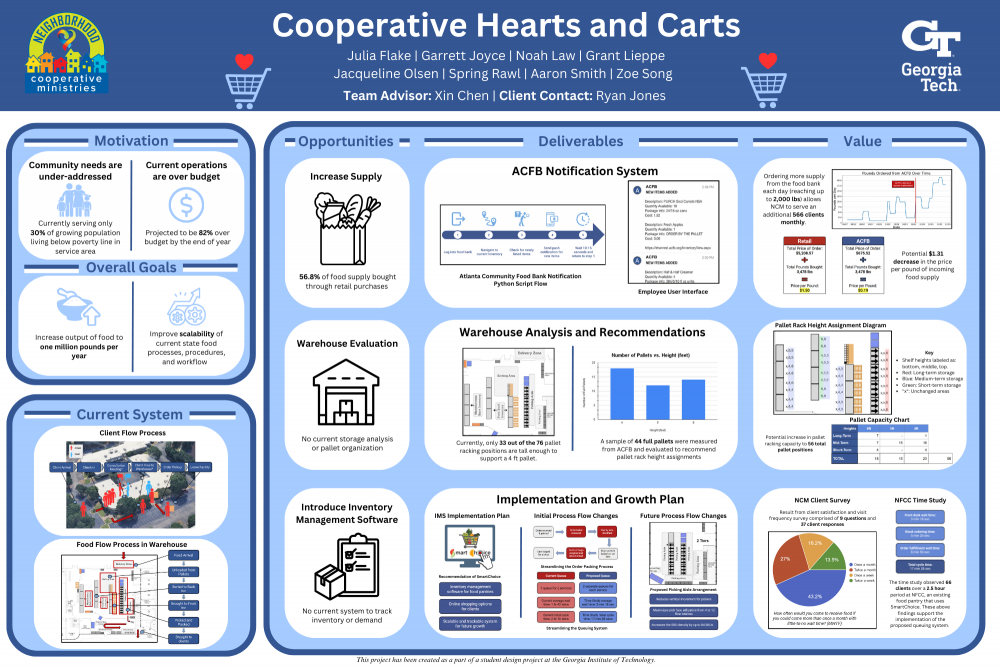Client Context
Neighborhood Cooperative Ministries (NCM), a faith-based nonprofit organization located in Gwinnett County, GA, operates 15 hours a week with 15 full-time staff members and over 200 consistent volunteers. Each month, NCM serves over 600 individual and family households, referred to as clients, that live at or below the poverty line. NCM provides two main services: food distribution and emergency financial assistance. Depending on their needs, clients may choose to participate in one or both services. They can pick up 50 pounds of food once a month and receive financial assistance with utility or rent bills once a year. NCM aims to gradually move away from providing financial assistance and focus more on serving clients through food distribution by increasing their total output while reducing costs.
Project Objective
NCM primarily serves the cities of Norcross and Peachtree Corners, where the population of individuals living in poverty is approximately 6,240. With a strong mission of supporting at-risk individuals and families, NCM aims to serve any client in need of assistance. NCM has set a clear goal to grow its food output to one million pounds per year, aligning with its commitment to addressing the growing community need.
NCM’s operations are financially overextended, with food costs projected to exceed its budget by 82% by the end of 2024, limiting the capacity for necessary investments in growth and process improvements.
To overcome these challenges and support its growth ambitions, the following opportunities for improvement have been identified based on the current state of NCM's system:
- Increase bulk food supply: Over 56.8% of NCM’s food supply is currently purchased at retail prices, significantly contributing to the organization's projected 82% budget overrun.
- Evaluate and optimize warehouse storage: NCM has not conducted a formal analysis of its storage capacity or layouts, which could hinder changing supply levels and sizes.
- Implement an inventory management system: Currently, there is no system to track inventory or demand, leading to an inability to scale operations effectively.
Design Strategy
To address the opportunity of increasing the incoming food supply, the team created and implemented a supplier notification system to receive more bulk food from a main supplier, the Atlanta Community Food Bank (ACFB), at a low cost. The first key consideration was selecting the appropriate framework to monitor the ACFB website. A solution was needed that was both highly customizable and robust enough to meet our specific requirements. Based on our experience and needs, the team chose to use Python to develop a script for monitoring the website. A Python script runs 24/7 to monitor the ACFB website and alerts NCM employees when food items are posted, increasing access to an affordable supply.
To equip the warehouse to handle the increase in bulk supply from ACFB, the team performed a warehouse analysis with documentation and recommendations. Any warehouse recommendations are constrained by the number of pallet racks, pallet shelves, and flow shelves that NCM already has.Aside from physical constraints, the design also must take into account the warehouse manager’s requirements and concerns. This includes minimum aisle widths, areas of the warehouse he wishes to remain untouched, and procedures that should not change immediately.
The third deliverable is a comprehensive implementation and growth plan for NCM’s current food system. To ensure a seamless transition to the new system, the team collaborated with the warehouse manager to develop the three parts of this deliverable: IMS implementation, initial process flow changes, and future process flow changes. The initial priority is to implement an IMS, supported by a detailed integration plan, followed by immediate changes along with the initial implementation of SmartChoice, and future changes to facilitate the growth of NCM’s operations.
These three deliverables work in tandem to increase throughput capacity, aligning with NCM’s goal of growing their food distribution and providing for more families in need.
Deliverables
The first opportunity is critical to reducing NCM’s reliance on costly retail purchases, allowing the organization to allocate funds more effectively. The second opportunity addresses physical constraints, which must be optimized to handle the goal of doubling output. Finally, the third opportunity ensures that NCM can effectively monitor and manage its inventory, enabling data-driven decisions for future growth.
To address these opportunities, the project team has developed three deliverables:
- A notification system to alert employees about potential food-sourcing opportunities.
- A warehouse analysis and documentation plan to identify and optimize storage solutions.
- An implementation plan for an inventory management software, along with a growth strategy, to track inventory and streamline operations.
Value and Impact
Since the implementation of the notification system, NCM has increased the supply of food from ACFB by 20,000 pounds per month, at savings of $1.31 per pound ordered. With increased supply from the food bank, NCM can now serve an additional 566 clients monthly, doubling the amount of people served. The total population living in poverty in NCM’s service area is 6,204, and NCM currently serves 30% of this population. The notification system will enable them to increase this to 59%.
By introducing new racking height assignments and implementing a pallet categorization system, NCM will increase its full pallet capacity from 33 to 56. This change is essential to accommodate the growing food supply driven by the notification system.
With the implementation of SmartChoice and the monthly food point system, NCM can offer food points as incentives for participation in their workshops. This incentive program supports the NCM board’s goal of increasing client engagement and building a sense of community. Additionally, the team wanted to consider all stakeholders in the implementation plan. To avoid overwhelming the warehouse manager, the implementation plan was separated into initial and future sections for a simpler integration with the current system.


